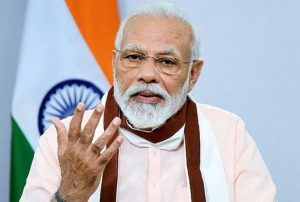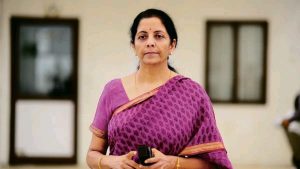
A day after India’s Prime Minister Narendra Modi heralded a new anthem for “Aatmanirbhar Bharat” or a self-reliant India and announced a historic $266 billion financial package to mitigate the COVID-19 impact, Finance Minister Nirmala Sitharaman unveiled a slew of steps to fructify the planned economic revival in the country.

In line with PM Modi’s vision of economic revival in a post-COVID-19 world, Ms Sitharaman said the definition of MSME has been changed so that they can grow in size and benefit. The investment limit for MSMEs has been revised upwards in addition to the rules of their turnover size. The earlier differentiation between manufacturing and services MSMEs will be categorized accordingly, the minister added.
She also announced Rs 3 lakh crore collateral-free automatic loans for businesses, including MSMEs. It is expected to benefit 45 lakh small businesses. The loan will have four-year tenure with a 12-month moratorium. Furthermore, the stressed MSMEs will be eligible for another Rs 20,000 crore for debt relief as well as equity support that would benefit some two lakh such businesses, she added.
The government will provide Rs 50,000 crore equity fusion for MSMEs that could not expand due to coronavirus, she said, adding that investments up to Rs1 crore and with a turnover of up to Rs5 crore will now be called micro industries.
Be Vocal for Local
Acting on PM Modi’s pitch of “Be Vocal for Local,” Home Minister Amit Shah announced that canteens of the central paramilitary forces will only sell made-in-India items starting from June 1. It is expected to encourage demand for indigenous products, which in turn boost the local manufacturers reeling under COVID-19. Mr Shah has appealed to the public to make maximum use of the locally made products and encourage others to do the same. “This is not the time to sit back and watch but to turn the disaster into an opportunity. If all of us decide to use only local products, then India can be self- sufficient in five years,” Mr Shah tweeted.
Five Pillars of self-reliance
On May 12, PM Modi announced a huge stimulus package, amounting to Rs 20 lakh crore to boost economic growth as part of the government’s “Aatmanirbhar Abhiyan.” “When India speaks of becoming self-reliant, it doesn’t advocate self-centeredness but self-reliance that would bring happiness, cooperation, and peace to the whole world,” Mr Modi had said in his address to the nation on May 12.
He said there are five pillars to becoming self-reliant: economy, infrastructure, system, demography, and demand that will bring a quantum jump in the Indian economy. “Infrastructure should become the identity of India; System should be based on the 21st-century technology-driven arrangements; Vibrant Demography is our source of energy for a self-reliant India; and Demand, whereby the strength of our demand and supply chain should be utilized to full capacity,” Mr Modi said.
He underlined the importance of strengthening all stakeholders in the supply chain to enhance their capacity and fulfill the demand. Mr Modi said it is the only way forward to ensure India becomes self-reliant. “The definition of self-reliance has changed in the globalized world; it is different from being self-centered. Self-reliance contributes to the progress in the whole world,” Mr Modi said. India’s culture considers the world as one family, and so it has a lot to contribute towards the development of the entire humanity, he said. Citing an example of turning a crisis into an opportunity, he said that the production of PPE N-95 masks in India has gone up to two lakh pieces daily from almost being negligible.
Financial Boost
The new stimulus package announced by the government is in combination with the earlier announcements made by the government and the RBI, totaling Rs 20 lakh crore, equivalent to almost 10% of India’s GDP. PM Modi said the package will focus on land, labor, liquidity, and laws, among other areas. It will cater to various sectors including the cottage industry, MSME, laborers, middle class, and heavy industries. He said the outlines of the package will be given by Ms Sitharaman on May 13.
In his speech, PM Modi said bold reforms are needed to make the country self-reliant so that the crisis such as COVID can be negated in future. These reforms include supply chain reforms for agriculture, rational tax system, simple and clear laws, capable human resources, and a strong financial system. These changes will promote business, attract investment, and further strengthen the “Make in India” mission. Mr Modi said self-reliance will prepare the country for tough competitions in the global supply chain. These scenarios were kept in mind while preparing the economic package that will not only increase efficiency but also ensure quality in various sectors, he added.
Mr Modi said “The crisis has taught us the importance of local manufacturing, market, and supply chains. All our demands during the crisis were met locally Now, it is time to be vocal about local products and help them become global.”
Living with COVID
Mr Modi noted that the virus will exist in society for a long time. So, our life mustn’t revolve only around it. He exhorted people to resume work while taking precautions like wearing masks and maintaining “do gaz doori” (six feet distance). He said the contours of the fourth stage of the lockdown will be different from the past. Based on the recommendations from the states, new rules will be framed, which will be conveyed to the public by May 18, he added.
Author Profile
- India Writes Network (www.indiawrites.org) is an emerging think tank and a media-publishing company focused on international affairs & the India Story. Centre for Global India Insights is the research arm of India Writes Network. To subscribe to India and the World, write to editor@indiawrites.org. A venture of TGII Media Private Limited, a leading media, publishing and consultancy company, IWN has carved a niche for balanced and exhaustive reporting and analysis of international affairs. Eminent personalities, politicians, diplomats, authors, strategy gurus and news-makers have contributed to India Writes Network, as also “India and the World,” a magazine focused on global affairs.
Latest entries
 DiplomacyJanuary 5, 2026India walks diplomatic tightrope over US operation in Venezuela
DiplomacyJanuary 5, 2026India walks diplomatic tightrope over US operation in Venezuela India and the WorldNovember 26, 2025G20@20: Africa’s Moment – The Once and Future World Order
India and the WorldNovember 26, 2025G20@20: Africa’s Moment – The Once and Future World Order DiplomacyOctober 4, 2025UNGA Resolution 2758 Must Not Be Distorted, One-China Principle Brooks No Challenge
DiplomacyOctober 4, 2025UNGA Resolution 2758 Must Not Be Distorted, One-China Principle Brooks No Challenge India and the WorldJuly 26, 2025MPs, diplomats laud Operation Sindoor, call for national unity to combat Pakistan-sponsored terror
India and the WorldJuly 26, 2025MPs, diplomats laud Operation Sindoor, call for national unity to combat Pakistan-sponsored terror







